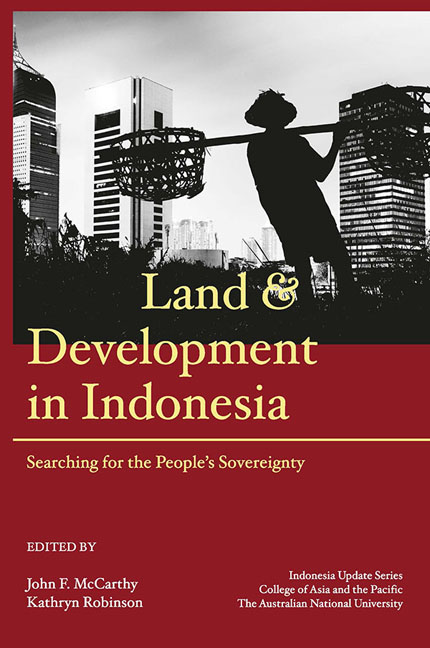Book contents
- Frontmatter
- Contents
- Tables
- Figures
- Contributors
- Acknowledgements
- Glossary
- Map
- 1 Land, economic development, social justice and environmental management in Indonesia: the search for the people's sovereignty
- PART 1 LAND USE AND LAND LAW: THE BIG PICTURE
- PART 2 ENVIRONMENTAL AND CUSTOMARY FRAMING OF LAND TENURE
- PART 3 URBAN AND INFRASTRUCTURE DEVELOPMENT
- 7 Eminent domain and infrastructure under the Yudhoyono and Widodo administrations
- 8 Housing low- and middle-income households: land development and policy practice in two Indonesian cities
- 9 Land and housing security for the urban poor
- PART 4 AGRICULTURE, LAND TENURE AND LIVELIHOODS
- PART 5 LARGE-SCALE LAND ACQUISITIONS AND SMALLHOLDER DEVELOPMENT
- Index
- Miscellaneous Endmatter
9 - Land and housing security for the urban poor
from PART 3 - URBAN AND INFRASTRUCTURE DEVELOPMENT
Published online by Cambridge University Press: 29 July 2017
- Frontmatter
- Contents
- Tables
- Figures
- Contributors
- Acknowledgements
- Glossary
- Map
- 1 Land, economic development, social justice and environmental management in Indonesia: the search for the people's sovereignty
- PART 1 LAND USE AND LAND LAW: THE BIG PICTURE
- PART 2 ENVIRONMENTAL AND CUSTOMARY FRAMING OF LAND TENURE
- PART 3 URBAN AND INFRASTRUCTURE DEVELOPMENT
- 7 Eminent domain and infrastructure under the Yudhoyono and Widodo administrations
- 8 Housing low- and middle-income households: land development and policy practice in two Indonesian cities
- 9 Land and housing security for the urban poor
- PART 4 AGRICULTURE, LAND TENURE AND LIVELIHOODS
- PART 5 LARGE-SCALE LAND ACQUISITIONS AND SMALLHOLDER DEVELOPMENT
- Index
- Miscellaneous Endmatter
Summary
The informal is a key component of the city, a space of social and economic activity that is out of the sight and control of the state and out of the reach of capitalist investments. Informal arrangements have long been acknowledged in the employment sector but increasingly the term is being used to describe informal forms of land tenure, housing and infrastructure construction, health services, neighbourhood governance and so on (Guinness 2009). With migration to the cities surging, the informal has become the lifeblood of the ‘insignificant masses’ (rakyat kecil), who may constitute over 50 per cent of the urban population. A 1980s survey conducted in nine Indonesian cities, for example, showed that 63 per cent of households who claimed to own land held unregistered titles, while only 37 per cent held formal, registered titles (Struyk, Hoffman and Katsura 1990).
As urban populations continue to grow, urban planners across the world struggle to compose viable means of accommodating increasing numbers of poor within urban spaces. Urban poverty is inseparable from the insecurity of tenure and illegality of housing and income strategies characterising low-income urban settlements. In Indonesia's urban worlds, the poor have devised a vast range of informal strategies to facilitate survival, including informal trading and production, informal housing solutions and informal governance of the low-income, squatter or slum areas known as kampung.
Informality has become a key focus of urban planning discussions in recent years. In a special issue of the journal Planning Theory and Practice, the main editor, Libby Porter, defines informality as the ‘other’ to ‘ordered, regulated, efficient’ systems of management (Porter 2011: 116). Although frequently dismissed as illegitimate, anarchic, messy and dangerous, the informal is not outside formal systems, Porter insists, but is instead produced by formal structures. Rather than painting the relation-ship between formal and informal as a static segmentation of the formal and informal spaces of the city, I suggest that it is more useful to consider the dynamic processes of formalisation and informalisation that are powered by the state, capital and citizens contesting the structures of land, housing and livelihood within the city.
Kusno (2015) writes that cities like Jakarta are shaped by three powerful overlapping forces: the creative, destructive force of capitalism; the violence of state discursive categories in managing the population; and the vernacular environment of the kampung.
- Type
- Chapter
- Information
- Land and Development in IndonesiaSearching for the People's Sovereignty, pp. 206 - 224Publisher: ISEAS–Yusof Ishak InstitutePrint publication year: 2016

